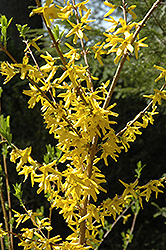Meadowlark Forsythia
Forsythia 'Meadowlark'
Height: 9 feet
Spread: 7 feet
Sunlight:
![]()
Hardiness Zone: 3
Other Names: Goldenbells
Description:
The harbinger of spring, with prolific yellow flowers smothering the branches in early spring ahead of the leaves, the rest of the year rather unassuming; an upright cultivar with a more controlled habit than the species, one of the hardiest varieties
Ornamental Features
Meadowlark Forsythia is smothered in stunning gold bell-shaped flowers along the branches in early spring before the leaves. The flowers are excellent for cutting. It has forest green deciduous foliage. The pointy leaves do not develop any appreciable fall color.
Landscape Attributes
Meadowlark Forsythia is a multi-stemmed deciduous shrub with an upright spreading habit of growth. Its average texture blends into the landscape, but can be balanced by one or two finer or coarser trees or shrubs for an effective composition.
This is a relatively low maintenance shrub, and should only be pruned after flowering to avoid removing any of the current season's flowers. Deer don't particularly care for this plant and will usually leave it alone in favor of tastier treats. It has no significant negative characteristics.
Meadowlark Forsythia is recommended for the following landscape applications;
- Mass Planting
- General Garden Use
Planting & Growing
Meadowlark Forsythia will grow to be about 9 feet tall at maturity, with a spread of 7 feet. It tends to be a little leggy, with a typical clearance of 2 feet from the ground, and is suitable for planting under power lines. It grows at a fast rate, and under ideal conditions can be expected to live for 40 years or more.
This shrub should only be grown in full sunlight. It is very adaptable to both dry and moist locations, and should do just fine under average home landscape conditions. It is not particular as to soil type or pH, and is able to handle environmental salt. It is highly tolerant of urban pollution and will even thrive in inner city environments. This particular variety is an interspecific hybrid.
